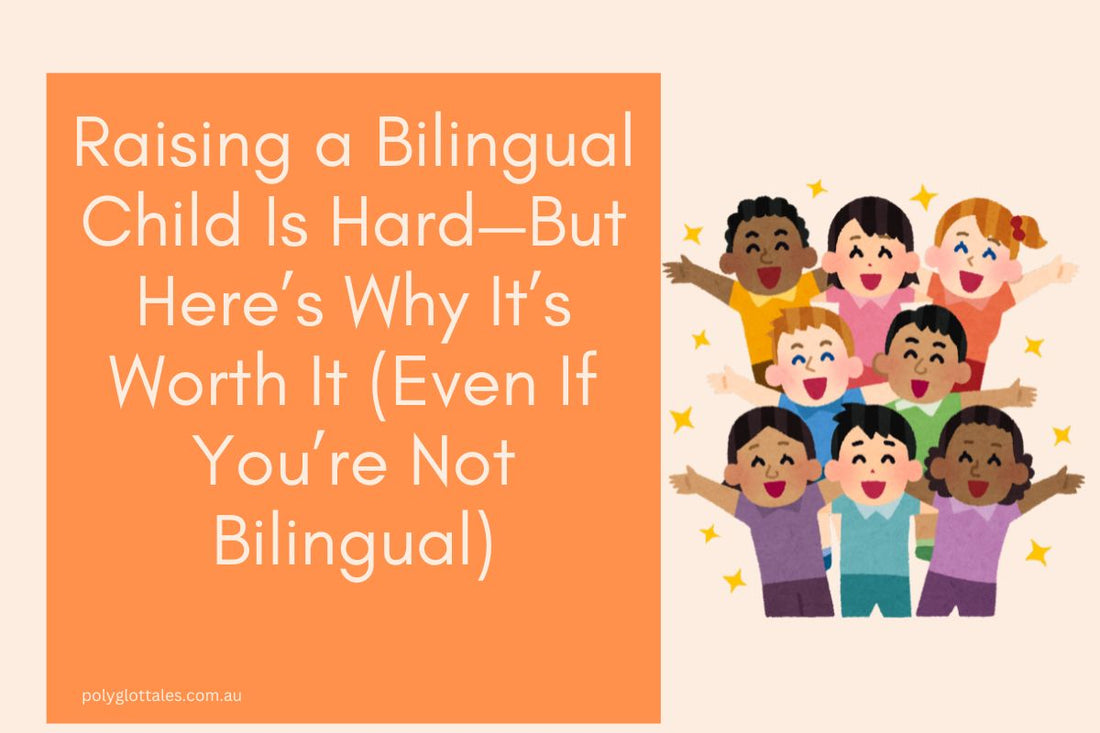Raising children comes with its fair share of challenges, and when you add language into the mix, things can get even more complicated. As parents in Australia—whether migrants trying to preserve a heritage language or non-migrants aiming to raise global citizens—many of us ask: Is raising a bilingual child really worth the struggle?
The short answer? Yes. A thousand times yes.
At Polyglot Tales, your children's language books store in Australia, we hear stories from families just like yours every day. Parents juggling the mental load of parenting while navigating identity, culture, and language. We see the frustration, but we also see the wins. Here’s why the uphill climb is worth every step.
The Real Struggles of Raising a Bilingual Child
1. Lack of Support Systems: Schools primarily operate in English, and unless you live in a multilingual household or community, you might feel like you’re doing it alone.
2. Time & Energy: Reading, speaking, and practicing in two languages takes effort. After a long day, slipping back into English feels easier.
3. Fear of Confusion: Many parents worry they’re confusing their child or delaying their speech development (a common myth, by the way).
4. Peer Pressure: Kids want to fit in. They may reject the "different" language, especially as they get older.
Why It’s Absolutely Worth It
1. Stronger Family Bonds
Language is connection. For migrant families, speaking a heritage language helps children connect with grandparents, cousins, and extended family across the globe.
2. Cultural Identity & Confidence
Children who grow up bilingual are more likely to have a strong sense of identity. They feel proud of their roots rather than distant from them.
3. Cognitive & Academic Benefits
Studies show bilingual children often excel in problem-solving, multitasking, and focus. It strengthens brain development from an early age.
4. Global Advantage
In an increasingly interconnected world, bilingualism is a massive asset. It opens up more career, travel, and cultural opportunities in adulthood.
5. Building Empathy & Openness
Speaking another language fosters empathy. It teaches children early that the world is beautifully diverse.
But What If You’re Not Bilingual?
You don’t need to be fluent to raise a bilingual or multilingual child. In fact, many non-migrant Australian families are actively choosing to expose their children to other languages because they understand the global value.
With access to books, songs, apps, and language-specific storytime sessions, parents can now support language exposure without needing to be native speakers themselves.
How Polyglot Tales Can Help
At Polyglot Tales, we curate beautiful picture books in Hindi, Japanese, Italian, Simplified Chinese, and Traditional Chinese for bilingual families in Australia. Our goal is to make reading in your target language feel like a treat, not a chore.
Every book we select is child-tested, helping your family build meaningful rituals around language—whether it’s bedtime stories, weekend reading, or morning songs.
Need help choosing the right language level or book theme? We’re here to help. Our Instagram community is also packed with ideas, tips, and monthly language challenges to keep your journey on track.
Yes, raising a bilingual child in Australia is hard. But it’s also powerful, purposeful, and profoundly rewarding. Whether you're holding onto heritage or opening doors to the world, you are giving your child a lifelong gift.
And you don’t have to do it alone.
Join our community at Polyglot Tales and explore children’s books that celebrate language, culture, and connection. Because this journey may be hard—but it’s worth every page you turn together.

